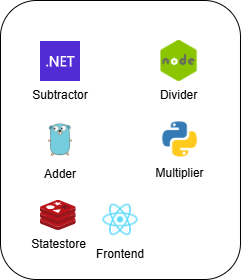.NET Aspire 多语言
在本文中,我想探讨如何利用 .NET Aspire 等工具来改进我们构建和部署分布式应用程序的方式,即使我们使用 .NET 以外的语言和框架也是如此。
什么是 .NET Aspire
.NET Aspire 是一个固执己见的、云就绪堆栈,旨在改善构建可观察、生产就绪的分布式应用程序的体验。它是通过处理特定云原生问题的 NuGet 包集合来交付的。
.NET Aspire 旨在帮助您:
- 编排:.NET Aspire 提供了用于运行和连接多项目应用程序及其本地开发环境依赖项的功能。
- 集成:.NET Aspire 集成是适用于常用服务(例如 Redis 或 Postgres)的 NuGet 包,具有标准化接口,确保它们与您的应用程序一致且无缝地连接。
- 工具:.NET Aspire 附带适用于 Visual Studio、Visual Studio Code 和 dotnet CLI 的项目模板和工具体验,可帮助您创建 .NET Aspire 项目并与之交互。
.NET Aspire 的核心可以在您从 .NET 模板开始使用 Aspire 时创建的 AppHost 项目中找到。 AppHost 项目定义了我们的分布式应用程序的组件,从服务(例如后端或前端)到资源(例如数据库或缓存)。
该项目可以生成一个清单,从基础设施的角度描述我们的应用程序。因此,Azure 开发人员 CLI 可以解释它以将应用程序部署到 Azure,而无需编写任何基础设施即代码。
使用不同的语言
当然,当我们使用分布式应用程序和微服务时,我们可能会遇到不同团队喜欢用不同语言编写代码的情况。当然,.NET Aspire 属于 .NET 生态系统。尽管如此,它的设计是能够与不同的语言和框架集成。
分布式计算器
让我们考虑一个简单的例子。我们有一个分布式计算器,它由不同的服务组成:前端服务和每个操作的后端。
- 前置:反应
- 减法:dotnet
- 添加:去
- 乘法:python
- 部门:nodejs
我们还有一个 redis 缓存来存储计算器的状态。

在这种情况下,我们可以使用 .NET Aspire 来构建分布式计算器,利用它附带的所有工具和集成。 Aspire 为某些语言提供本机支持,但我们也可以使用容器扩展它以支持其他语言。
在撰写本文时,.NET Aspire 支持以下语言:
- 多种 JS 框架(React、Angular、Vue、NodeJS)
- Python
以下是我们如何配置 AppHost 项目中的所有后端服务:
戈兰
Golang 本身不支持,因此我们将其添加为容器。请注意,我们可以决定在运行 AppHost 来发布清单或进行本地开发的场景中使用不同的图像。
// Configure Adder in Go
var add = (builder.ExecutionContext.IsPublishMode
? builder.AddContainer("addapp", "acrt6xtihl2b3uxe.azurecr.io/addapp")
: builder.AddContainer("addapp", "addapp"))
.WithHttpEndpoint(targetPort: 6000, env: "APP_PORT", name: "http")
.WithOtlpExporter()
.WithEnvironment("OTEL_SERVICE_NAME", "addapp")
.PublishAsContainer();
var addEnpoint = add.GetEndpoint("http");
Python
原生支持Python,因此我们可以使用AddPythonProject方法来配置乘数服务。请按照本教程正确配置Python项目。
// Configure Multiplier in Python
var multiply = builder.AddPythonProject("multiplyapp", "../../python-multiplier", "app.py")
.WithHttpEndpoint(targetPort: 5001, env: "APP_PORT", name: "http")
.WithEnvironment("OTEL_SERVICE_NAME", "multiplyapp")
.PublishAsDockerFile();
NodeJS
原生支持NodeJS,因此我们可以使用AddNodeApp方法来配置divider服务。
// Configure Divider in NodeJS
var divide = builder.AddNodeApp(name: "divideapp", scriptPath: "app.js", workingDirectory: "../../node-divider")
.WithHttpEndpoint(targetPort: 4000, env: "APP_PORT", name: "http")
.WithEnvironment("OTEL_SERVICE_NAME", "divideapp")
.PublishAsDockerFile();
。网
这并不奇怪,.NET Aspire 原生支持 .NET,因此我们可以使用 AddProject 方法来配置减法器服务。
// Configure Subtractor in .NET
var subtract = builder.AddProject<Projects.dotnet_subtractor>("subtractapp")
.WithReference(insights)
.WithEnvironment("OTEL_SERVICE_NAME", "subtractapp");
雷迪斯
可以使用 AddRedis 方法轻松配置 Redis 缓存,或者在本场景中通过 AddDaprStateStore 方法使用 Dapr。
// Configure Dapr State Store
var stateStore = builder.AddDaprStateStore("statestore");
Dapr不是本文的重点,但值得一提的是.NET Aspire可以与Dapr结合使用来构建分布式应用程序。有关 Dapr 的更多信息,请参考官方文档。
反应
最后,我们可以使用 AddNpmApp 方法配置前端服务。
// Configure Frontend in React
builder.AddNpmApp(name: "calculator-front-end", workingDirectory: "../../react-calculator")
.WithDaprSidecar(new DaprSidecarOptions
{
AppPort = 3000,
AppProtocol = "http",
DaprHttpPort = 3500
})
.WithEnvironment("DAPR_HTTP_PORT", "3500")
.WithReference(addEnpoint)
.WithReference(multiply)
.WithReference(divide)
.WithReference(subtract)
.WithReference(stateStore)
.WithReference(insights)
.WithHttpEndpoint(targetPort: 3000, env: "PORT")
.WithExternalHttpEndpoints()
.WithEnvironment("OTEL_SERVICE_NAME", "calculator-front-end")
.PublishAsDockerFile();
由于我们引用了所有先前配置的服务,因此我们可以轻松地将它们连接到前端服务。当我们需要从前端调用加法器时,我们可以使用 Aspire 注入的环境变量轻松实现:
app.post('/calculate/add', async (req, res) => {
try {
const serviceUrl = process.env.services__addapp__http__0;
const appResponse = await axios.post(`${serviceUrl}/add`, req.body);
// Return expected string result to client
return res.send(`${appResponse.data}`);
} catch (err) {
console.log(err);
}
});
Further considerations
The entire application can be deployed to Azure using the Azure Developer CLI. The CLI will read the manifest generated by the AppHost project and deploy the application to Azure, creating all the necessary resources. To learn how to integrate Aspire with the Azure Developer CLI, please reference the official tutorial.
All the code for the distributed calculator can be found in the Aspire Multilanguage repository.
以上是.NET Aspire 多语言的详细内容。更多信息请关注PHP中文网其他相关文章!

热AI工具

Undresser.AI Undress
人工智能驱动的应用程序,用于创建逼真的裸体照片

AI Clothes Remover
用于从照片中去除衣服的在线人工智能工具。

Undress AI Tool
免费脱衣服图片

Clothoff.io
AI脱衣机

Video Face Swap
使用我们完全免费的人工智能换脸工具轻松在任何视频中换脸!

热门文章

热工具

记事本++7.3.1
好用且免费的代码编辑器

SublimeText3汉化版
中文版,非常好用

禅工作室 13.0.1
功能强大的PHP集成开发环境

Dreamweaver CS6
视觉化网页开发工具

SublimeText3 Mac版
神级代码编辑软件(SublimeText3)
 Python vs. JavaScript:学习曲线和易用性
Apr 16, 2025 am 12:12 AM
Python vs. JavaScript:学习曲线和易用性
Apr 16, 2025 am 12:12 AM
Python更适合初学者,学习曲线平缓,语法简洁;JavaScript适合前端开发,学习曲线较陡,语法灵活。1.Python语法直观,适用于数据科学和后端开发。2.JavaScript灵活,广泛用于前端和服务器端编程。
 从C/C到JavaScript:所有工作方式
Apr 14, 2025 am 12:05 AM
从C/C到JavaScript:所有工作方式
Apr 14, 2025 am 12:05 AM
从C/C 转向JavaScript需要适应动态类型、垃圾回收和异步编程等特点。1)C/C 是静态类型语言,需手动管理内存,而JavaScript是动态类型,垃圾回收自动处理。2)C/C 需编译成机器码,JavaScript则为解释型语言。3)JavaScript引入闭包、原型链和Promise等概念,增强了灵活性和异步编程能力。
 JavaScript和Web:核心功能和用例
Apr 18, 2025 am 12:19 AM
JavaScript和Web:核心功能和用例
Apr 18, 2025 am 12:19 AM
JavaScript在Web开发中的主要用途包括客户端交互、表单验证和异步通信。1)通过DOM操作实现动态内容更新和用户交互;2)在用户提交数据前进行客户端验证,提高用户体验;3)通过AJAX技术实现与服务器的无刷新通信。
 JavaScript在行动中:现实世界中的示例和项目
Apr 19, 2025 am 12:13 AM
JavaScript在行动中:现实世界中的示例和项目
Apr 19, 2025 am 12:13 AM
JavaScript在现实世界中的应用包括前端和后端开发。1)通过构建TODO列表应用展示前端应用,涉及DOM操作和事件处理。2)通过Node.js和Express构建RESTfulAPI展示后端应用。
 了解JavaScript引擎:实施详细信息
Apr 17, 2025 am 12:05 AM
了解JavaScript引擎:实施详细信息
Apr 17, 2025 am 12:05 AM
理解JavaScript引擎内部工作原理对开发者重要,因为它能帮助编写更高效的代码并理解性能瓶颈和优化策略。1)引擎的工作流程包括解析、编译和执行三个阶段;2)执行过程中,引擎会进行动态优化,如内联缓存和隐藏类;3)最佳实践包括避免全局变量、优化循环、使用const和let,以及避免过度使用闭包。
 Python vs. JavaScript:社区,图书馆和资源
Apr 15, 2025 am 12:16 AM
Python vs. JavaScript:社区,图书馆和资源
Apr 15, 2025 am 12:16 AM
Python和JavaScript在社区、库和资源方面的对比各有优劣。1)Python社区友好,适合初学者,但前端开发资源不如JavaScript丰富。2)Python在数据科学和机器学习库方面强大,JavaScript则在前端开发库和框架上更胜一筹。3)两者的学习资源都丰富,但Python适合从官方文档开始,JavaScript则以MDNWebDocs为佳。选择应基于项目需求和个人兴趣。
 Python vs. JavaScript:开发环境和工具
Apr 26, 2025 am 12:09 AM
Python vs. JavaScript:开发环境和工具
Apr 26, 2025 am 12:09 AM
Python和JavaScript在开发环境上的选择都很重要。1)Python的开发环境包括PyCharm、JupyterNotebook和Anaconda,适合数据科学和快速原型开发。2)JavaScript的开发环境包括Node.js、VSCode和Webpack,适用于前端和后端开发。根据项目需求选择合适的工具可以提高开发效率和项目成功率。
 C/C在JavaScript口译员和编译器中的作用
Apr 20, 2025 am 12:01 AM
C/C在JavaScript口译员和编译器中的作用
Apr 20, 2025 am 12:01 AM
C和C 在JavaScript引擎中扮演了至关重要的角色,主要用于实现解释器和JIT编译器。 1)C 用于解析JavaScript源码并生成抽象语法树。 2)C 负责生成和执行字节码。 3)C 实现JIT编译器,在运行时优化和编译热点代码,显着提高JavaScript的执行效率。






